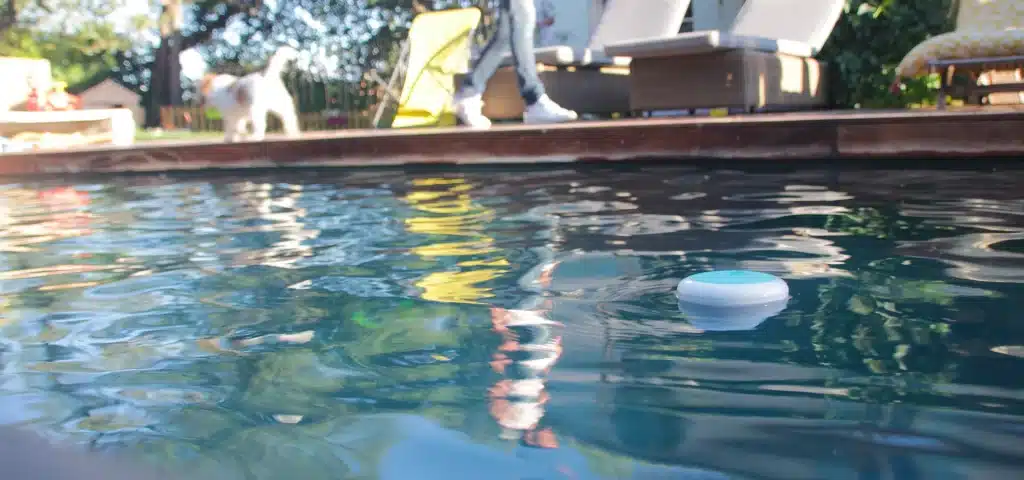Salt water treatment requires the installation of an electrolyzer. This is a more costly initial investment than with other water treatments such as bromine or chlorine. In recent years, however, it has become increasingly popular with pool owners (30% of the market in France). In fact, a salt pool is more ecological and economical in the long term. Families with young children appreciate the bathing comfort of salt. If you're not sure how to treat your pool, read this article to find out.

Choosing a salt treatment to disinfect your pool water requires the installation of an electrolyzer. This is an electrical device that connects to the filtration circuit located in the technical room. Sea salt injected into the water is transformed by electrolysis into sodium hypochlorite, i.e. unstabilized chlorine. The electrode permanently and regularly breaks down the salt in the water into natural chlorine and caustic soda. When the chlorine has disinfected the water, under the effect of the sun's rays, it becomes salt again, recombining with the caustic soda. Then the cycle starts all over again.
Thanks to this process, chlorine, produced in small quantities, effectively eliminates micro-organisms and bacteria present in the water.
Unlike chlorine or bromine treatments, salt water treatment requires a higher initial investment. The cost of an electrolyzer varies between €800 and €3000, depending on the model. You can choose from an entry-level chlorinator that needs to be activated manually, to the most sophisticated models (automated and connected to the Internet) that can be controlled from your smartphone.
Salt-based pool treatment has only been popular in France for a few years now, but it's now a popular choice for pool owners all over the world.
Despite its real ecological and safety advantages, salt treatment has a few constraints that you should be aware of:
To ensure that the chlorinator works properly and produces the right amount of chlorine, add salt at the start of the season.
Le taux de sel optimal se situe entre 3000 et 5 000 ppm (soit 3 à 5 g/L). Le seuil dépend beaucoup du modèle de votre électrolyseur, c’est pourquoi il faut vous référer aux indications du fabricant.
To start with, you add the right amount of salt according to the volume of your pond. Here's the calculation method you need to know. Recommended salt rate x Pool volume = Quantity of salt to be added to the pool. Here's an example:
There are three solutions for measuring salt concentration in water:
Check salt levels regularly. Particularly after heavy rain and in the days following the addition of salt, to check that it is converting properly into chlorine and soda.
Salt electrolysis for swimming pools is the most environmentally friendly of all treatments. If you have young children or allergy sufferers, it's certainly the right choice for you, especially as the storage of sea salt represents no danger. However, you should be aware that this is an option that requires more monitoring (water temperature, electrolyzer operation, pH ). We recommend investing in automated equipment for testing water parameters, for greater peace of mind.
| Cookie | Duration | Description |
|---|---|---|
| cookielawinfo-checkbox-analytics | 11 months | This cookie is set by GDPR Cookie Consent plugin. The cookie is used to store the user consent for the cookies in the category "Analytics". |
| cookielawinfo-checkbox-functional | 11 months | The cookie is set by GDPR cookie consent to record the user consent for the cookies in the category "Functional". |
| cookielawinfo-checkbox-necessary | 11 months | This cookie is set by GDPR Cookie Consent plugin. The cookies is used to store the user consent for the cookies in the category "Necessary". |
| cookielawinfo-checkbox-others | 11 months | This cookie is set by GDPR Cookie Consent plugin. The cookie is used to store the user consent for the cookies in the category "Other. |
| cookielawinfo-checkbox-performance | 11 months | This cookie is set by GDPR Cookie Consent plugin. The cookie is used to store the user consent for the cookies in the category "Performance". |
| viewed_cookie_policy | 11 months | The cookie is set by the GDPR Cookie Consent plugin and is used to store whether or not user has consented to the use of cookies. It does not store any personal data. |